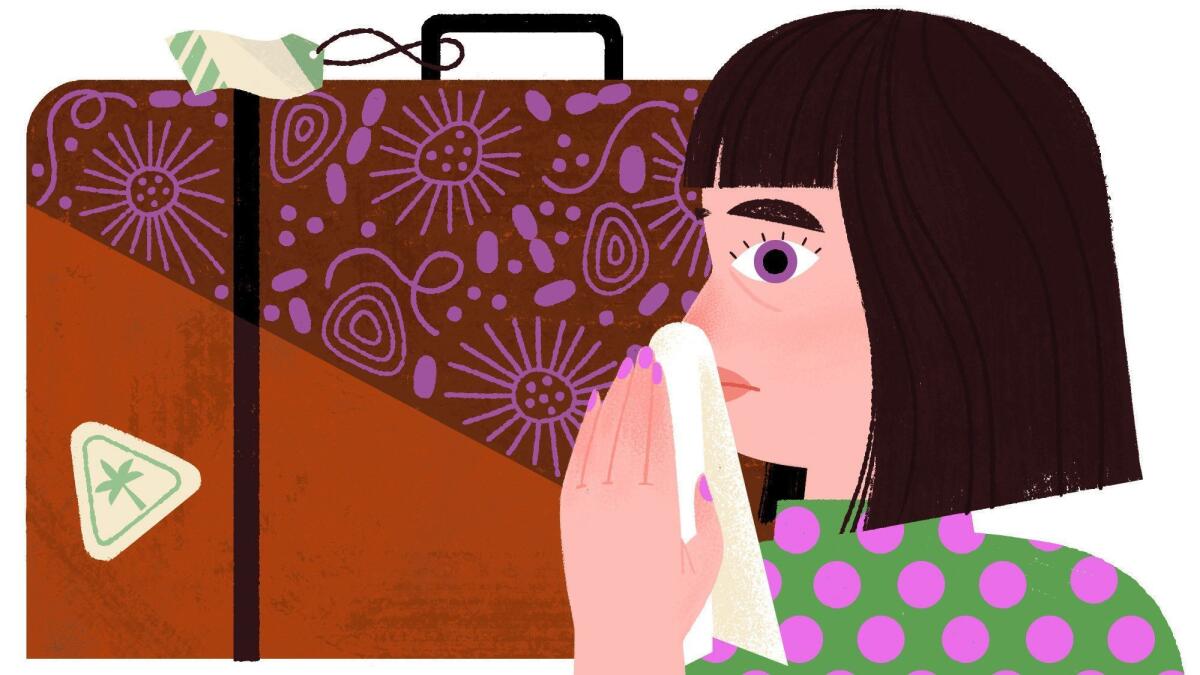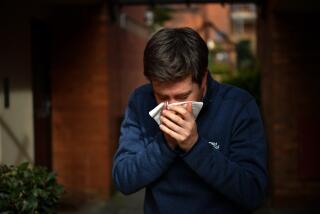Here’s why you get sick after vacation — and how you can prevent it

You’ve returned from vacation and that post glow is fading fast. Your nose is dripping, you’re sneezing and your throat is sore. Or your stomach is upset and you have diarrhea. Why is this your reward for travel, and how can you prevent it? And what if your symptoms don’t go away?
Chances are it’s not the return home that made you sick, as we sometimes believe. Familiarity may breed contempt, but it also may give you a certain immunity.
“When traveling… one is exposed to viruses to which they are not accustomed,” Dr. Mark Dressner, a family physician in Long Beach, said in an email.
“At home, it is the same old cold viruses [to which] you might have built up enough immunity. Upon traveling you are exposed to similar viruses from around the country or the world but different enough that your body is not accustomed and you get sick from this virus,” said Dressner, who has been on 14 medical missions to Honduras and two along the Amazon in Brazil.
Another culprit: enclosed spaces, whether an airplane, cruise ship or car or the great indoors, to which we retreat when it’s chilly or rainy, said Dr. Robert Winters, an infectious disease specialist and founder of Westside Travel Medicine and Immunizations in Santa Monica.
“People are very, very effective at spreading various viruses and bacteria [by] coughing and sneezing,” he said, adding that you also may touch something an infected traveler has touched, such as a handrail or an airplane’s seat-back tray table.
Statistics vary on whether touching your face happens a couple of times an hour or hundreds of times a day, but it takes only one strong germ to find its way to its new home.
That welcome-home gift may be just a cold, which comes on gradually and is bundled with a stuffy nose and maybe mild chest discomfort, according to a chart from the Centers for Disease Control and Prevention that compares it with the flu, which comes on fast with a fever, sometimes chills and usually with aches.
When do you check with a doctor? If your symptoms persist for more than five days, nasal discharge is changing colors and you have fever, fatigue and malaise, said Dr. Nikhil Bhayani, a Fellow of the Infectious Diseases Society of America and a physician at Texas Health Resources who specializes in infection diseases.
This flu season has been milder than last, the CDC reported, but in the three weeks ending Jan. 26, more than 100 people in California have died of the flu. If you think you have the flu, it’s a good idea to check with your doctor. Flu tends to peak in February, the Los Angeles Times recently reported, and seems to be hitting younger people harder.
Besides being up to date on immunizations and, of course, avoiding sick people, your best bet in combating respiratory illnesses, whether you’re home or on the road, is hand washing, Winters said. Not near a washroom? Hand sanitizer can be help, and packets of wipes can do double duty by allowing you to wipe down that tray table and other common surfaces.
And, Winters noted, “good sleep and good diet” can help ward off illnesses. Don’t forget to factor in jet lag as something that can play havoc with that sleep, he added.
Stomach upset
It seems odd that our stomachs may be upset when we return home, especially because we’re now drinking water and eating foods that sometimes meet a higher sanitation standard. Is this our gastrointestinal tract rebelling against that?
Probably not. Chances are you picked up a bug before you left your vacation destination and it’s been incubating, preparing for its surprise attack just when you think you’re safe.
What can help alleviate symptoms: Pepto-Bismol, Imodium and other over-the-counter medications.
Many people carry an antibiotic when they’re abroad in case they fall victim to traveler’s diarrhea, and that may be effective upon your return. But, Winters said, it’s important to know that not all antibiotics work on illnesses in all parts of the world.
The antibiotic Cipro, for instance, is often prescribed for travelers, but its effectiveness in some areas of the world has waned, so be specific with your doctor before you leave and don’t be tempted to use old, leftover meds after you return to fight whatever you have.
The best prevention is making sure you aren’t eating undercooked meats or fish and being cautious about raw vegetables, water that’s not bottled and drinks with ice.
Be especially cautious as your trip ends, Dressner said: “Travelers have their guard down as a trip is winding down, so that salad or drink with ice looks mighty good, but one might not be as strict on that last day.”
Be aware that what you inadvertently drink can cause problems as well. That might be leptospira, bacteria found in water that is contaminated by feces, often from rodents, Bhayani said. Be cautious about swimming in fresh water. Leptospira can be found abroad, but it also can be found in fresh water in the U.S.
Again, if you’re experiencing symptoms after five days, it’s time to check with your doctor, and it’s especially important to communicate where you have been and some of the experiences you have had that could contribute to your illness.
If you’re a traveler, you know you can’t swaddle yourself in cotton and expect to see the world. But the precautions you take may mean the only after-effect of a vacation is just grumpiness that it’s over. The cure for that? Start planning your next adventure.
Have a travel dilemma or question? Write to travel@latimes.com. We regret we cannot answer every inquiry.
More to Read
Sign up for The Wild
We’ll help you find the best places to hike, bike and run, as well as the perfect silent spots for meditation and yoga.
You may occasionally receive promotional content from the Los Angeles Times.







